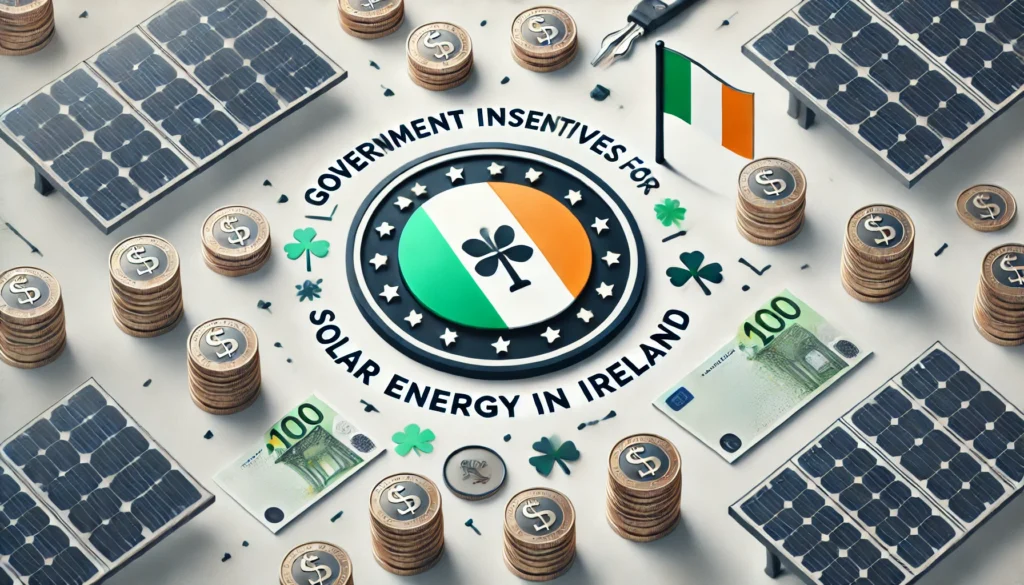
Ireland has made significant strides in promoting renewable energy, with solar energy playing a pivotal role. To accelerate the adoption of solar power, the Irish government has introduced various incentives and support schemes. This article explores the range of government incentives available for solar energy in Ireland, detailing the benefits for homeowners and businesses, and how these programs are helping to drive the country towards a sustainable future.
Overview of Government Incentives
The Irish government has implemented a series of incentives aimed at encouraging the use of solar energy. These initiatives are designed to make solar installations more affordable, thereby increasing the overall uptake of solar power across the country. Key incentives include grants, tax credits, and support schemes.
Solar PV Grants
One of the most well-known incentives is the Solar PV Grant provided by the Sustainable Energy Authority of Ireland (SEAI). This grant is available to homeowners who wish to install solar photovoltaic (PV) panels on their properties.
Eligibility and Application Process
To qualify for the SEAI Solar PV Grant, homeowners must meet certain criteria, including owning a home built before 2021 and using the property as their primary residence. The application process involves an initial assessment by an SEAI-registered contractor, followed by the installation of the solar PV system. Once the installation is complete, homeowners can apply for the grant, which provides up to €3,800 towards the cost of the solar panels.
Financial Benefits
The grant significantly reduces the upfront cost of solar panel installation, making it more accessible to a broader range of homeowners. By lowering the initial investment, the grant helps homeowners achieve quicker returns on their investment through energy savings.
Accelerated Capital Allowance (ACA)
For businesses, the Accelerated Capital Allowance (ACA) scheme is a valuable incentive. This program allows companies to deduct the full cost of energy-efficient equipment, including solar panels, from their taxable profits in the year of purchase.
Benefits for Businesses
The ACA scheme provides a financial boost to businesses looking to invest in renewable energy. By allowing the cost of solar panels to be written off against taxable income, the scheme reduces the financial burden and improves the return on investment. This incentive encourages more businesses to adopt solar energy, contributing to Ireland’s renewable energy targets.
Renewable Electricity Support Scheme (RESS)
The Renewable Electricity Support Scheme (RESS) is another key initiative aimed at increasing the share of renewable energy in Ireland’s electricity grid. RESS operates through competitive auctions where renewable energy projects, including solar farms, bid for support contracts.
Auction Process and Benefits
RESS auctions are designed to promote cost-effective renewable energy projects. Successful bidders receive guaranteed payments for the electricity they generate, providing financial stability and predictability. This scheme encourages large-scale solar projects, contributing to Ireland’s renewable energy capacity and supporting the transition to a low-carbon economy.
Microgeneration Support Scheme (MSS)
The Microgeneration Support Scheme (MSS) is aimed at small-scale renewable energy producers, including homeowners, farmers, and small businesses. The scheme provides financial incentives for the installation of microgeneration technologies, such as solar PV systems, and includes payments for excess electricity exported to the grid.
Benefits for Small-Scale Producers
The MSS empowers individuals and small businesses to become energy producers, contributing to the decentralization of Ireland’s energy supply. By providing financial support and compensating for excess electricity, the scheme makes it more economically viable for small-scale producers to invest in solar energy.
Impact of Government Incentives
Increasing Solar Adoption
Government incentives have played a crucial role in increasing the adoption of solar energy in Ireland. The financial support provided by these schemes has made solar installations more affordable, encouraging more homeowners and businesses to invest in solar technology.
Reducing Carbon Emissions
By promoting the use of solar energy, government incentives are helping to reduce Ireland’s carbon emissions. Solar energy generates electricity without emitting greenhouse gases, making it a clean and sustainable alternative to fossil fuels. The increased use of solar power contributes to Ireland’s efforts to meet its climate targets and transition to a low-carbon economy.
Economic Benefits
The growth of the solar energy sector, driven by government incentives, has significant economic benefits. The installation and maintenance of solar panels create jobs and stimulate local economies. Additionally, the reduced energy costs for homeowners and businesses result in increased disposable income and improved competitiveness.
Challenges and Future Outlook
Administrative and Regulatory Challenges
While government incentives have been successful in promoting solar energy, there are challenges that need to be addressed. The administrative process for applying for grants and support schemes can be complex and time-consuming. Simplifying the application process and providing clearer information can help increase participation rates.
Grid Integration and Storage
As the adoption of solar energy grows, integrating this intermittent energy source into the national grid becomes more challenging. Investing in energy storage solutions and upgrading grid infrastructure are essential to ensure the reliability and stability of the energy supply.
Continued Government Support
Continued government support is crucial for the sustained growth of solar energy in Ireland. Expanding existing incentives, introducing new support mechanisms, and fostering innovation in solar technology will help maintain momentum and achieve long-term renewable energy goals.
Conclusion
Government incentives have been instrumental in driving the growth of solar energy in Ireland. By providing financial support and creating a favorable regulatory environment, these initiatives have made solar energy more accessible and attractive to homeowners and businesses. As Ireland continues its transition to a sustainable energy future, the ongoing support and development of solar energy will play a vital role in achieving environmental and economic goals.
